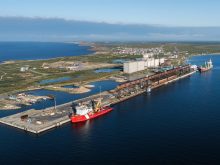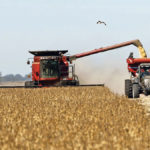Farm groups are urging the federal government to resolve rail delays as blockades by some Indigenous groups and their supporters have crippled Canada’s transportation system.
The Grain Growers of Canada has said the blockades will have immediate and unintended consequences for farmers across the country.
“By cutting us off from our customers, our industry, economy, and, ultimately, our reputation as a reliable shipper is at risk,” GGC chair Jeff Nielsen said in a news release.
Canadian National Railway announced Feb. 11 it is shutting down significant parts of its network, saying blockades have made it difficult to move goods.
Read Also

Petition launched over grazing lease controversy
Battle continues between the need for generation of tax revenue from irrigation and the preservation of native grasslands in southern Alberta rural municipality.
The shutdown will affect the entire network east of Toronto, potentially resulting in layoffs of CN workers, the company said.
Some Indigenous groups and their supporters are protesting the construction of the Coastal GasLink pipeline in British Columbia.
In all, 20 First Nations band councils have signed agreements in favour of the project. However, Wet’suwet’en hereditary chiefs refuse to accept the authority of those elected bodies, saying council authority applies only to reserve land and much of the pipeline project is not on a reserve.
In solidarity with the hereditary chiefs, supporters and environmental activists have set up blockades at several locations in the country, namely on the rail network near Belleville, Ont., and between Prince George and Prince Rupert in B.C., which is where CN has stopped service.
Blockades in the Vancouver area have also caused problems at the Port of Vancouver, Canada’s largest export point.
“This situation is regrettable,” said J.J. Ruest, the president and chief executive officer of CN, in a statement to media.
“These protests are unrelated to CN’s activities and beyond our control,” he said. “Our shutdown will be progressive and methodical to ensure that we are well set up for recovery, which will come when the illegal blockades end completely.”
Many farming organizations are concerned with the shutdown, saying it will affect the movement of agricultural goods.
Nielsen said without export markets, it’s difficult for farmers to survive.
“Any delay may result in losing out on critical markets that purchase our grains and oilseeds through our eastern, western and southern corridors,” GGC said in the news release.
CN Initiating Progressive and Orderly Shutdown of its Eastern Canadian Network. https://t.co/X2COCBbp7w pic.twitter.com/RuOCbDV1JH
— Canadian National (@CNRailway) February 13, 2020
Farmer organizations in Alberta have also expressed concerns.
They say the blockades are only compounding problems. Farmers faced a difficult harvest last year and have previously experienced delays in the rail network, namely the CN strike.
“We are still recovering from the harvest from hell and need reliable grain movement in order to get back on track,” said Dave Bishop, chair of Alberta Barley.
The Alberta barley and wheat commissions said in a news release that Canada’s cargo ships are backed up, with 39 ships waiting at the Port of Vancouver. It said eight ships are waiting at the Port of Prince Rupert in northern B.C.
The backlog hurts Canada’s reputation, said Todd Hames, chair of the Alberta Wheat Commission.
“Situations like this put Canada at risk of losing out on export opportunities to our competitors,” he said.
Fertilizer Canada said the government needs to lift the blockades, arguing now is a critical time for farmers to gain access to fertilizer.
It said it supports the right to peaceful protest, but the blockades are crippling the movement of essential goods.
CN has obtained a court injunction to end the protests in Ontario. Activists, however, have ignored it. They’ve also ignored requests from the Tyendinaga Police to voluntarily dismantle the blockade.
The injunction threatens arrest for those who interfere with the rail line. Ontario Provincial Police have not yet enforced the injunction.
The federal government hasn’t intervened. Indigenous Services Minister Marc Miller has agreed to meet with protest groups.
Transport Minister Marc Garneau plans on meeting with provincial government representatives, and has been in contact with CN and CP.
He said in a statement that while freedom of expression is a democratic right, these activities must respect the court decisions and the law.
The protesters in Ontario have said they won’t leave until RCMP leave the traditional Wet’suwet’en territory in northern B.C.
Hereditary leaders of the Wet’suwet’en and supporters of their cause have been blocking access to the construction site of the Coastal GasLink pipeline.
Contact jeremy.simes@producer.com
















